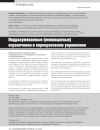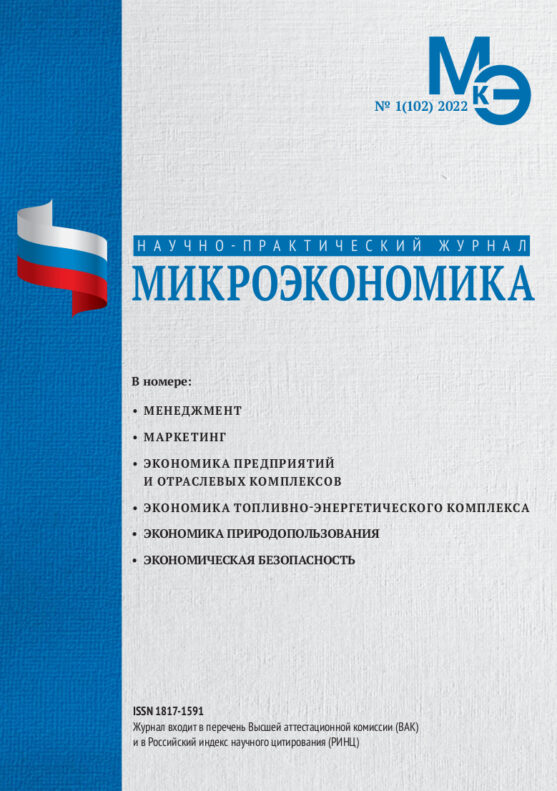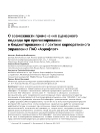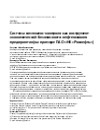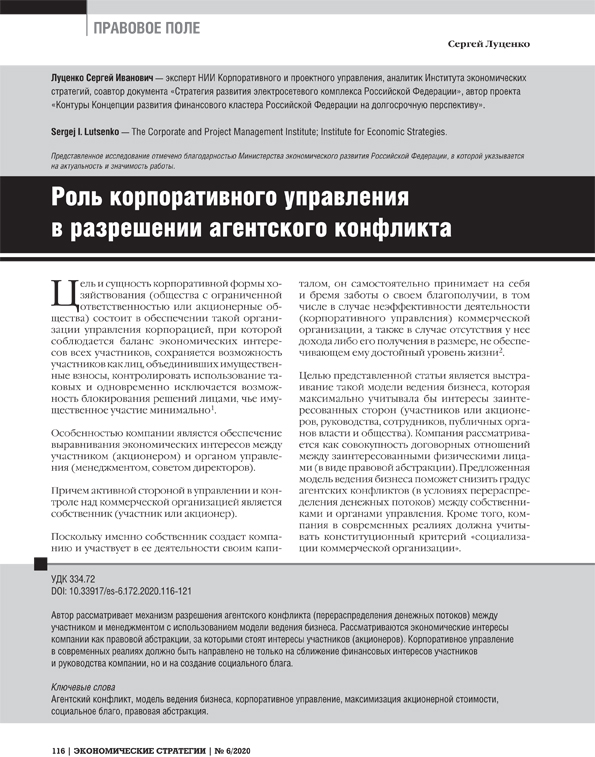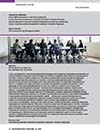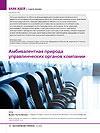Implied (Implicit) Limitations on Corporate Governance
DOI: https://doi.org/10.33917/es-4.184.2022.134-143
The author examines the compliance of the legal nature of the company with the principle of social justice. The shareholder has priority in corporate governance by virtue of the economic and legal status. The interests of a participant (shareholder) are derived from the interests of a commercial organization. The goals of the company must take into account the interests of other stakeholders in modern conditions. The author proposes a tool of “implied limitations” which allows to include an element of social justice in managerial discretion.
Источники:
1. O rekomendatsiyakh Bazel’skogo komiteta po bankovskomu nadzoru “Printsipy sovershenstvovaniya korporativnogo upravleniya” [On the Recommendations of the Basel Committee on Banking Supervision “Principles for Improving Corporate Management”]. Kodeks, available at: https://docs.cntd.ru/document/902328968.
2. Postanovlenie Konstitutsionnogo suda RF ot 23 aprelya 2012 g. N 10-P “Po delu o proverke konstitutsionnosti abzatsa desyatogo stat’i 2 Zakona Rossiiskoi Federatsii ‘O zanyatosti naseleniya v Rossiiskoi Federatsii’ v svyazi s zhaloboi grazhdanki E.N. Erlikh” [Resolution of the RF Constitutional Court of April 23, 2012 No. 10-P “On the Сase of Сhecking Сonstitutionality of the Tenth Paragraph of Article 2 of the Law of the Russian Federation “On Employment in the Russian Federation“ in Relation to the Complaint of Citizen E.N. Erlich”]. Konsul’tantPlyus, available at: http://www.consultant.ru/document/cons_doc_LAW_128931/
3. Informatsionnoe pis’mo Banka Rossii ot 12 iyulya 2021 g. N IN-06-28/49 “O rekomendatsiyakh po raskrytiyu publichnymi aktsionernymi obshchestvami nefinansovoi informatsii, svyazannoi s deyatel’nost’yu takikh obshchestv” [Bank of Russia Information Letter No. IN-06-28/49, Dated July 12, 2021, “On Recommendations for Disclosing Non-Financial Information by Public Joint Stock Companies Related to the Activities of Such Companies”]. Vestnik Banka Rossii, 2021, no 48.
4. Measuring Stakeholder Capitalism: Towards Common Metrics and Consistent Reporting of Sustainable Value Creation. White paper. September 2020. World Economic Forum, available at: https://www3.weforum.org/docs/WEF_IBC_Measuring_Stakeholder_Capitalism_Report_2020.pdf.
5. Bebchuk L., Tallarita R. The Illusory Promise of Stakeholder Governance. Cornell Law Review, 2020, vol. 106, pp. 91–178.
6. Elhauge E. The Inevitability and Desirability of the Corporate Discretion to Advance Stakeholder Interests. Harvard Law School, Cambridge, 2021, pp. 1–39.
7. Elhauge E. Sacrificing Corporate Profits in the Public Interest. New York University Law Review, 2005, vol. 80, pp. 733–869.
8. Blair M., Stout L. A Team Production Theory of Corporate Law. Virginia Law Review, 1999, vol. 85, pp. 247–328.
9. Postanovlenie Evropeiskogo suda po pravam cheloveka ot 7 iyulya 2020 g. po delu “Al’bert i drugie protiv Vengrii” [Judgment of the European Court of Human Rights of 7 July 2020 in the Case of Albert and Others v. Hungary]. Arbitrazhnyi protsessual’nyi kodeks Rossiiskoi Federatsii, available at: https://apkrfkod.ru/pract/postanovlenie-espch-ot-07072020/



